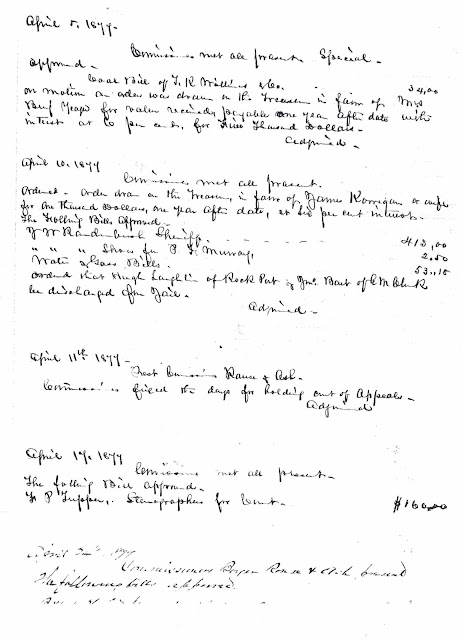Chapter 23 - Kerrigan Is Paid
Mrs.
Fannie Kerrigan, James’ wife, was destitute during the trials. The newspapers
bathed their columns in human interest stories on the Mollies. The Herald
visited Mrs. Kerrigan, and found her in bitterly reduced straits. She and her children
were down to “eating bread and water”
and were to be evicted for failure to pay their rent. The poor woman mournfully
reported that she was planning to sell her furniture, farm out the children,
and “go out to service”. When the
reporter asked her if she would “live
with Jimmy again”, she said she would “if
he promises to be kind to me, but if he is rough with me, I won’t stay with him
a day.” But, she added, “I’m not
sorry I testified, and I told Jimmy in jail…that I would go on the stand
against him again if the court wanted me to.” (Broehl, Page 329).
When Benjamin F. Yost, the policeman, was assassinated, the Tamaqua council offered a reward of one thousand dollars for the arrest and conviction of the murderer. The Schuylkill County Commissioners had also offered five hundred dollars additional (Patriot, page 1). At the exact time, that James Kerrigan was released by the Carbon County Court and Jail, at a meeting of the Carbon County Commissioners, the official meeting minutes of April 10, 1877, showed Kerrigan was paid $1,000.00, but there was no indication as to the reason for the payment. This would be the equivalent, according to US Bureau of Labor Statistics, of $24,000.00 based on today’s currency. He was later paid, another $500.00, the equivalent of $12,000.00 in today’s currency.
This is the concurrence needed to prove that James Kerrigan was given leniency for his testimony against those convicted of murder. On September 15, 1877, the Carbon Advocate newspaper reported that, “Jimmy Kerrigan, the notorious Mollie Maguire, was in Pottsville the other day for his witness fees in the several murder trials. Frank Hughes gave him a letter recommending their payment.” (Carbon Advocate, September 15, 1877, page 4). I was unable to ascertain the amount given to Kerrigan from Schuylkill County, however, from Carbon County, he was given, at least, the total of $1,500.00 (the equivalent of $36,000.00 in today’s currency). The total average salary of a miner in 1877, was around $300 to $400 annually.
Minutes from Carbon County Commissioners


No comments:
Post a Comment